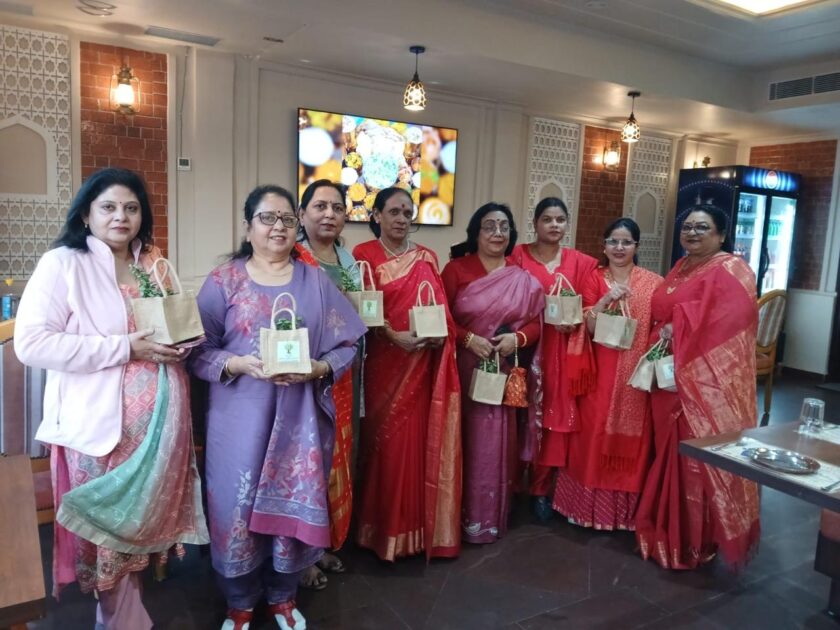Lucknow: In a significant move towards making Uttar Pradesh a hub for Artificial Intelligence (AI) and Information Technology (IT), Chandigarh University Lucknow organized the two-day “UP AI Synergy Conclave 2025.” The conclave brought together policymakers, global AI experts, academia, and industry stalwarts to establish synergy among stakeholders and position India as a global AI hub, in line with Prime Minister Narendra Modi’s vision.
The event saw the participation of UP Minister of State (Independent Charge) for Vocational Education, Skill Development & Entrepreneurship, Kapil Dev Agarwal, and Satnam Singh Sandhu, Member of Parliament (Rajya Sabha) and Chancellor of Chandigarh University. Over 30 CEOs, founders, presidents, and vice presidents of various companies, AI experts, academia, industry leaders, angel investors, and students from higher educational institutions attended the conclave.
Key Participants and Industry Leaders
Notable attendees included Varun Agarwal (Founder, Change Engine), Shailesh Kumar (Chief Data Scientist, Reliance Jio), Abhilasha Gaur (CEO, Nasscom’s IT-ITeS Sector Skill Council), Maya Sherman (AI Literacy Project Co-lead, Global Partnership on Artificial Intelligence), Umesh Kataria (AVP, EXL Digital), Rishabh Nag (Co-founder, Humanli.AI), Aman Singal (Head of Digital & Analytics, JK Tyre & Industries Ltd.), Suchit Mujumdar (Co-founder, Accredian), Nirmal Vatsyayan (Head – Research and AI), Nandan Mishra (CEO & Co-founder, Algo8), Abhishek Srivastava (Co-founder and CEO, MBAtrek Pvt. Ltd.), CP Joshi (Co-founder and CEO, ixamBee), Saumya Shukla (Co-founder, Dectrocel Health Care and Research Pvt. Ltd.), and several others from leading tech firms.
Key Announcements and MoUs Signed
The conclave witnessed the signing of multiple Memorandums of Understanding (MoUs) between Chandigarh University Lucknow and leading tech companies. These agreements focused on:
- Skill training and campus placements
- Technology transfer and setting up AI-driven laboratories
- Practical training for students
- Industry collaborations for AI research
Bridging Industry and Academia for AI Growth
Industry experts emphasized that the conclave marked an essential step toward linking education with industry demands, ensuring that students are well-prepared for AI-related futuristic jobs. They also highlighted how MoUs would facilitate curriculum development, mentorship programs, and hands-on AI experience for students.
Kapil Dev Agarwal, UP Minister of State for Vocational Education, Skill Development & Entrepreneurship, stated, “With an investment of Rs. 2500 crore in Chandigarh University Lucknow, the initiative will provide vast opportunities for students, particularly those from Uttar Pradesh.” He further elaborated on how the UP government is building a 170-acre AI hub in Lucknow to support AI-led innovations.
Agarwal referenced Prime Minister Narendra Modi’s AI-centric speeches in France and the United States, noting, “PM Modi envisions India as a leader in AI, competing with the US, Japan, and China. To achieve this, we must develop a skilled workforce that does not just seek jobs but creates them.”
Satnam Singh Sandhu on AI and India’s Global Standing
Member of Parliament and Chancellor of Chandigarh University, Satnam Singh Sandhu, stated, “India is becoming a focal point for AI development, and Chandigarh University Lucknow will contribute significantly by integrating AI into multidisciplinary education. We aim to establish an ‘India AI Foundation’ to realize PM Modi’s vision of a ‘Viksit Bharat’.”

Sandhu praised PM Modi’s co-chairing of the AI Action Summit in Paris and emphasized the Rs. 10,000 crore investment by the Government of India in AI. He also acknowledged Uttar Pradesh’s Rs. 1,000 crore investment in an AI hub, stating that this will place India among the global leaders in AI innovation.
Vision for AI: The Next Leap in Technology
Speaking on India’s AI trajectory, Varun Agarwal, Founder of Change Engine, underscored the importance of strategic investment in next-gen AI technologies. He urged India to move beyond existing AI models like ChatGPT and China’s DeepSeek AI, advocating for forward-thinking innovations that set India apart globally.
“We should not just build foundational AI models but look ahead to the next technological leap. Many AI models today suffer from hallucination, energy inefficiency, and fabricated outputs. India must focus on overcoming these challenges and leading the next AI revolution,” he stated.
Agarwal emphasized the importance of AI diffusion across all sectors, from education to government processes, citing India’s UPI success story as an example of technological revolution.
AI’s Role in India’s Future
The UP AI Synergy Conclave 2025 has set a strong foundation for AI-driven growth in India. With significant investments, policy alignments, and academic-industry collaborations, Uttar Pradesh is poised to become a major AI hub. The conclave reaffirmed India’s ambition to not only keep up with global AI advancements but to be a pioneer in cutting-edge AI technologies.
With Chandigarh University Lucknow emerging as India’s first AI-integrated multidisciplinary education campus, the future of AI in Uttar Pradesh and India looks promising, paving the way for transformative growth and technological excellence.
Additional Highlights from the Conclave:
- Panel discussions on AI ethics, policy frameworks, and responsible AI adoption.
- Live AI demonstrations showcasing the latest advancements in generative AI, robotics, and automation.
- Investor networking sessions fostering AI startups and innovation-driven enterprises.
As AI continues to shape the digital landscape, events like the UP AI Synergy Conclave 2025 will play a crucial role in building a robust AI ecosystem, ensuring India remains at the forefront of global technological progress.








